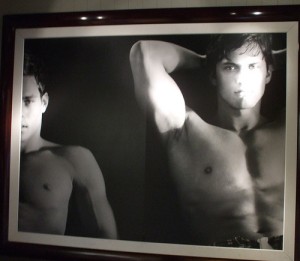 In 2005, helpful big sister Brittney Maxson tried to enter an A&F dressing room at the Mall of America to assist her younger sibling, 14-year-old Molly, who is autistic.
In 2005, helpful big sister Brittney Maxson tried to enter an A&F dressing room at the Mall of America to assist her younger sibling, 14-year-old Molly, who is autistic.
She was confronted by store staff, who said that Abercrombie policy didn’t allow more than one person in a dressing room at a time in an attempt combat shoplifting. The girls had encountered the same policy at another store, but they allowed the sisters in the dressing room at that store after they understood the situation.
At Abercrombie & Fitch, Brittney explained her sister’s special needs, but was still refused. Their mom, Beth, tried to talk to management and the girls were still refused. Beth even called a customer service hotline while at the store and the request was still ignored.
Four years later, the clothing store has been ordered to pay $115,264 for discriminating against a disabled person.
[social_buttons]
At the beginning of the lawsuit, lawyers for A&F–no joke–questioned whether the girl was even disabled. Molly Maxson was diagnosed as autistic when she was 2 years old.
The shopping trip was supposed to be a fun way to help Molly fit in better at school. But Brittney had to help her sister try on clothes. As she said to the Star-Tribune,
Because of her autism, she’s very vulnerable. In social situations, everything is new to her. It’s very unpredictable how she’ll act. … We’ve never left her alone, even at home.
After getting the cold bony hipster shoulder, Beth Maxson did what any parent would. Numerous times she tried to contact A&F about the way they were treated and was ignored. So she turned to the Minnesota Department of Human Rights.
Four years later, administrative law judge Kathleen D. Sheehy ruled that Abercrombie & Fitch violated the Minnesota Human Rights Act and ordered the company to pay the girl $25,000 and cover the family’s attorney fees of $41,069. The company had to pay the state a $25,000 fine and cover other expenses totaling $24,194. In her ruling, she said,
She was singled out and required to hear her sister and mother repeatedly ask for accommodations based on her disability, in front of a long line of customers, at a store that markets itself to young people as a purveyor of a particularly desirable ‘look.
For her part, Molly said that A&F made her feel like a “misfit”.
Abercrombie & Fitch, while not appealing the ruling, is asking that the penalties be lowered. This is unlikely, as Judge Sheehy said the company had,
transformed this case from a relatively simple matter into the expensive proceeding it has become.
Image: PinkMoose on Flickr under a Creative Commons License.
Wow. And yet another reason I will not shop at Abercrombie & Fitch.
Why did they wait 4 years later? Because they wanted money for the bad economy. And her mom was there too. Also, her sister was trying on clothes not her? That makes me sick for what people in this country do to earn a quick dollar.
Did the lawsuit take four years? They had every reason to want to take A & F to court. I agree some lawsuits are frivolous, but definitely NOT this one.
@Christopher: Did you read the judge’s last quote? She said that A&F dragged it out when it should have been a simple matter. Only $25,000 goes to the girl. The rest is fines and legal fees. It doesn’t seem like it had to get to this point, but they made a mountain out of this molehill. (Seriously…questioning whether she was disabled?!)
Amanda is right; this is not frivolous.